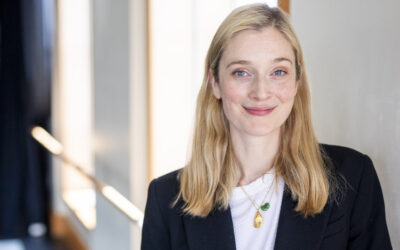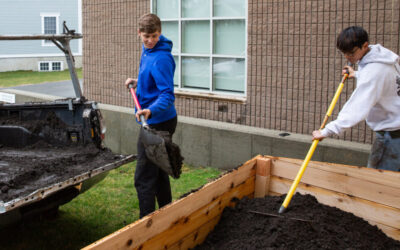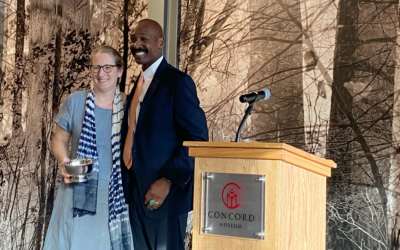CA Faculty Introduce a Method for Self-Reflection and Seek to Coordinate the Academic Experience for First-Year Students
How do you learn? What are you learning about yourself? What are you learning in community? Introduced during CA’s orientation for new students, these essential questions are part of a framework that is helping 9th graders learn the skills they need to flourish at Concord Academy. Intentionally broad, the questions encourage exploration of learning strategies and reflection on personal values and ways of relating to others. With their advisors, 9th grade students are using them to set and review individual goals during their first year at CA.
Science teacher Kim Kopelman and history teacher Emma Storbeck—both 9th grade class advisors—were charged last year with piloting a coordinated onboarding program for 9th grade students. A generous alumna, Gale Hurd ’61, who was concerned about the pandemic’s effect on academic readiness, is funding the approach. CA had already identified this as a critical focus; the pandemic, and this gift, made it a top priority.
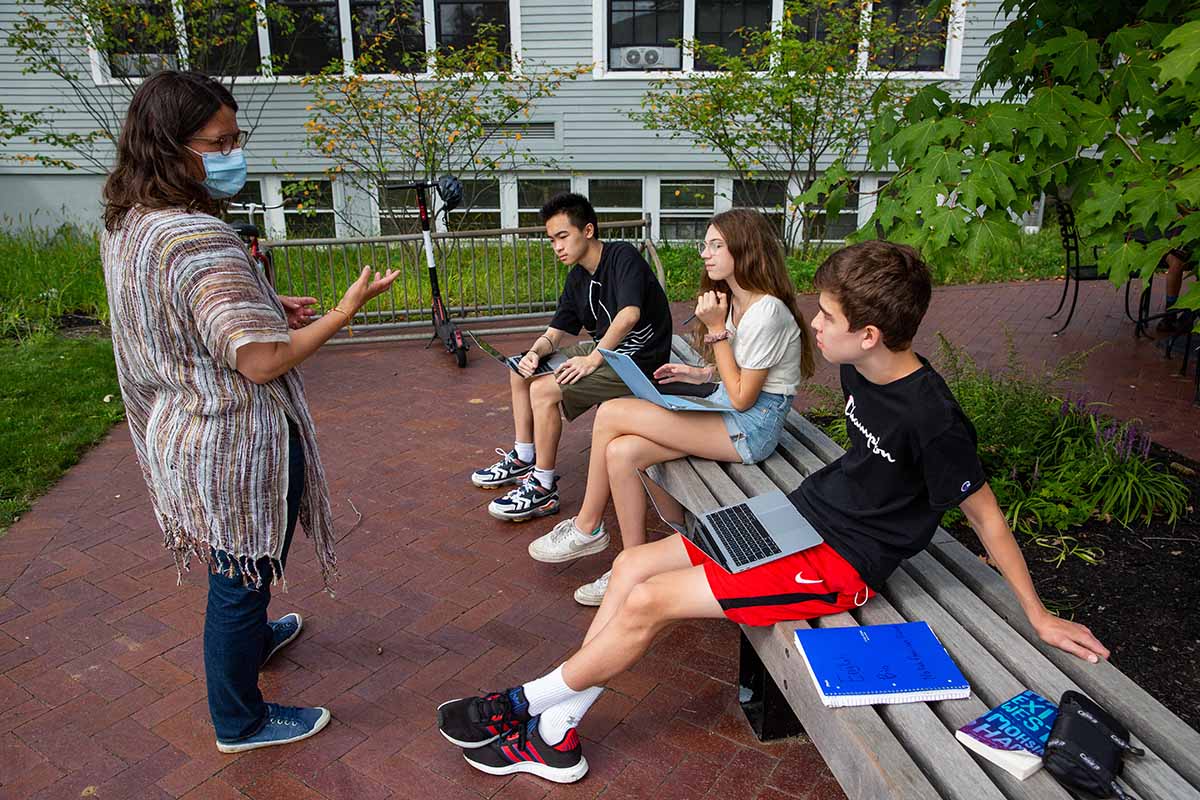
English teacher Laurence Vanleynseele P’22 engages 9th grade students in one of her courses early in the fall.
Through organic conversation with their colleagues, Kopelman and Storbeck are establishing norms around explaining to students how learning is expected to take place. “We can’t assume all of our students have these skills,” Kopelman says. “We have to give them the strategies they need to be successful in this diverse environment.”
During dedicated meetings, 9th grade teachers and advisors have been sharing with each other how they support fundamental approaches to learning and identifying areas of synergy across CA’s wide-ranging curriculum. Throughout the year, students are creating portfolios that chart personal and academic growth.
“We know that CA teachers are already teaching how to learn,” Storbeck says. “What we’re trying to do is make the implicit explicit, to be more intentional about how we’re teaching so that students can be more intentional about their learning.”
Kopelman says it’s not unusual for students to experience a “crisis of confidence” in their first year at CA: “They identify as A students, then all of a sudden they get a lower grade.” As a tutor in CA’s Academic Support Center, she finds it rewarding to help students who may be seeing themselves as failures find a more nuanced and empowering perspective.
Take, for instance, procrastination. “That’s not about laziness,” Kopelman says. “It’s about an emotional reaction or block, and to address it we can chunk time to create reasonable goals for achieving success, create outlines, brainstorm, or make a plan for taking breaks. When students hear about these strategies for the first time, it’s like a light bulb goes on. They’ve felt procrastination reflects on them personally, and no one has ever talked with them about it before.”
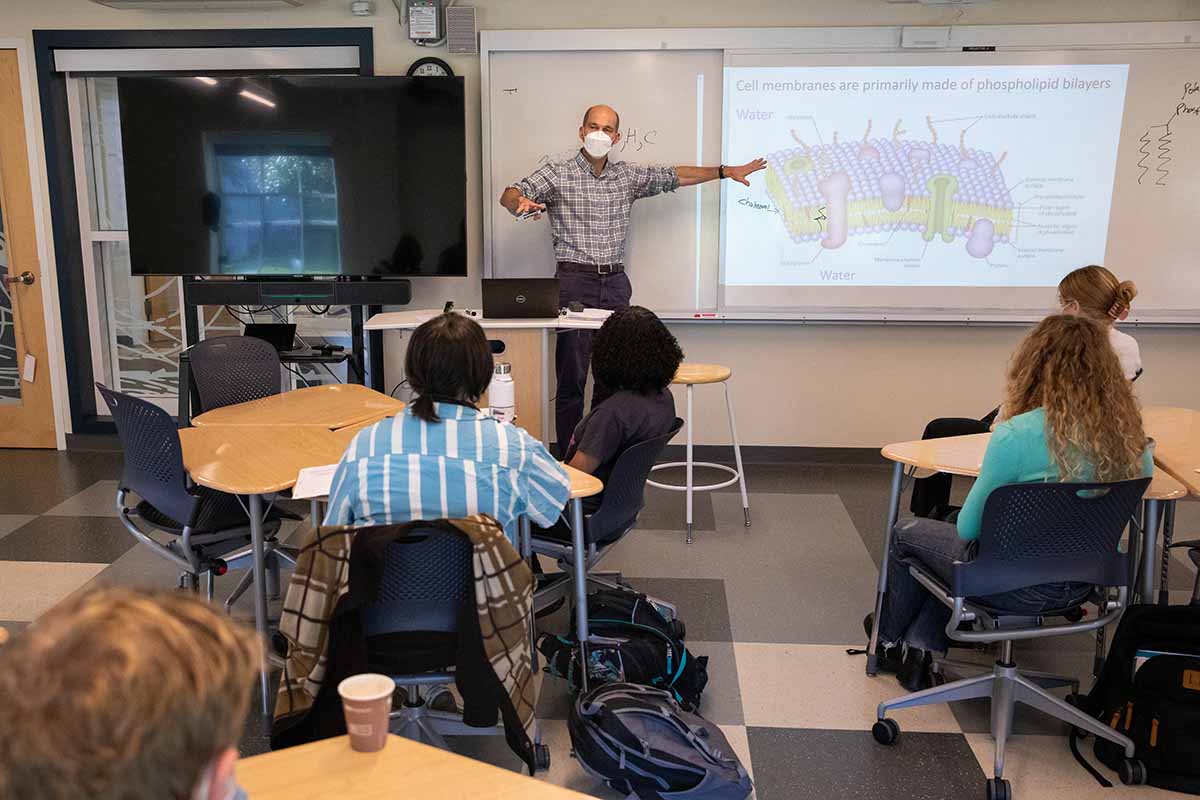
James Booth teaches a biology class for 9th graders.
While some such approaches to teaching learning skills have been refined over years, other scaffolding for students is being developed this year in response to the conditions of remote learning they have experienced during the pandemic. “Students could have more clarity about what they’re being assessed on,” Storbeck says, by way of example. “Last year, when we were having discussions in Zoom breakout rooms, I assigned a lot of written work. Now that we’re back in the classroom, I listen to them speak instead, but there’s a sense of stress that is new. They’re wondering, ‘Am I being assessed on what my teacher overhears?’”
Sharing anecdotes like this is one way that Kopelman and Storbeck are helping build synergy among their colleagues. In October, in one of many meetings dedicated to reviewing the 9th grade experience over the course of the year, faculty members and advisors chimed in with their own experiences to collectively build a better understanding of the needs of 9th graders.
“In the performing arts, our classes have an emphasis on experiential learning, but just being in person and existing together in three dimensions is something we’re still getting comfortable with again this year,” said theater teacher Shelley Bolman in that meeting. “Intro classes are focused on being in our bodies and in relationship with other people. I’m taking that more slowly than I ever have, because I’m being more thoughtful as a teacher but also because I feel we all need it.”
Renee Coburn, who teaches Health and Wellness courses and is working in partnership to reconceive that curriculum at CA, told her colleagues at the same meeting that she’d been asking students to reflect on how they know they’re stressed. “‘What does that look like, and how would I know that?’ I ask them,” she said. “It’s a way to bring in metacognition, to help students think mindfully about stress, to understand how that shows up for them and also what it might look like for adults.”
In addition to identifying supports that students need for developing fundamental learning skills, Kopelman and Storbeck have been connecting with colleagues across the school to identify common conceptual themes across the many courses open to 9th grade students, with a goal of increasing coordination among faculty members and approaching the 9th grade learning experience more intentionally.
In preparation for this work, they reviewed the school’s curriculum offerings for 9th graders. “I was floored by the diversity of courses,” Kopelman says. With so many options, few CA 9th graders have an identical academic experience—a fact that Kopelman and Storbek celebrate but have also been foregrounding as they lead discussions with their colleagues throughout this year about what it’s like to be a 9th grade student at CA.
As teachers from various departments have taken turns sharing their expectations for first-year students and the challenges and growth areas they have identified, discussions among faculty have touched on everything from consistency in grading and awareness of students’ comprehensive workload to specific skills—such as citing evidence for arguments, developing the habit of attending to process, gaining comfort with ambiguity, and taking risks—that students need to master to succeed at CA. “It’s been really interesting and fun to talk like this, to be able to bring a perspective from a bio classroom and hear something similar from a history teacher, a Spanish teacher,” Kopelman says. “It’s so easy to be siloed, and I’m excited by the possibility of making progress collaboratively this year.”
This sustained and multifaceted review of the 9th grade experience has already helped to reinforce a curricular structure intended to help new students acclimate to academic expectations at Concord Academy. In their first semester at CA, 9th graders receive feedback on their assignments, but course grades are not included in their cumulative GPA. Kopelman says students haven’t always taken this initial pass/no credit semester as the academic runway it’s intended to be, but that this year she has noticed a distinct shift in attitude. “During Orientation, we framed this period as our way of introducing them to all of these things so that they can figure out how to be the students they want to be at CA, without any limits,” she says. “This fall, I was hearing students say, ‘This feedback I’m getting now will help me in January when grades start to count.’”
